Qatar Invites Iran's President Raisi To Doha Gas Summit
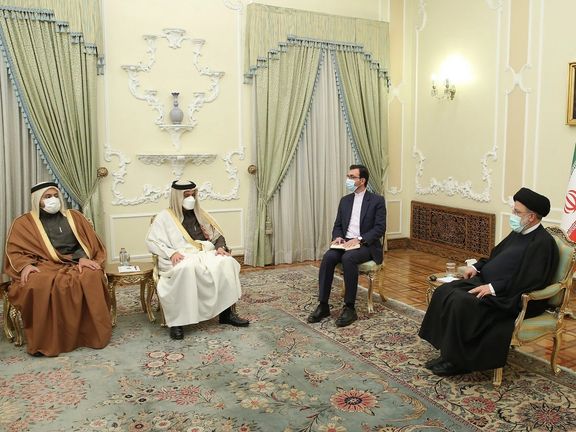
Qatar has invited Iranian President Ebrahim Raisi to attend the upcoming meeting of the Gas Exporting Countries Forum (GECF).

Qatar has invited Iranian President Ebrahim Raisi to attend the upcoming meeting of the Gas Exporting Countries Forum (GECF).
During Thursday’s meeting in Tehran with Iranian foreign minister Hossein Amir-Abdollahian, foreign minister Mohammed bin Abdulrahman Al-Thani delivered the Qatari Emir’s invitation. The Sixth GECF Summit of Heads of States and Governments is slated for Doha in February.
GECF, which is headquartered in Doha, is an inter-governmental organization of the world's leading gas exporters aimed at increasing coordination. Iran and Qatar share the world’s largest gas-field, with the Iranian part known as South Pars and Qatar’s as North Dome.
Earlier in the day, Iran's official news agency said Al-Thani’s visit should not be seen as facilitating direct talks with Washington, so responding to suggestions in domestic and foreign media that al-Thani aimed to thereby improve prospects for reviving the 2015 nuclear deal.
The visit took place with Emir Sheikh Tamim bin Hamad al-Thani due to meet United States President Joe Biden at the White House January 31 to discuss global energy security as well as the Vienna nuclear talks.
Washington is liaising with energy-producing states and firms over possible diversion of supplies to Europe should Russia invade Ukraine. Moscow supplies one-third of Europe’s natural gas and might stop winter deliveries if sanctioned by the US or western Europe over any action in Ukraine.
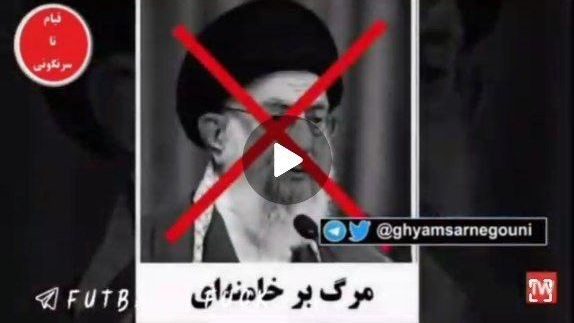
Several television and radio channels of Iran’s state broadcaster were hacked Thursday with photos of leaders of an opposition group briefly aired.
The image of Massoud and Maryam Rajavi, leaders of the Albania-based opposition Mujahideen-e Khalq (MEK), were broadcast for around 10 seconds with audio footage from one of their speeches in the background.
Massoud Rajavi disappeared during the 2003 invasion of Iraq, where the MEK was then based in alliance with Saddam Hussein, and is widely believed dead.
After the picture of the MEK leaders, the video showed a photo of Iran’s Supreme leader Ali Khamenei with a red cross on it, as an off-camera voice said, “Death to Khamenei.” It was unclear whether this was a recording of slogans chanted during protests. Khamenei was badly injured in 1981 in one of a series of bombings attributed to the MEK.
There was also a red circle on the video, which called for an uprising in Iran to overthrow the current regime. The video then cut into footage of a snowy screen disturbance that is usually aired on TV when there is a technical problem.
The first channel of the national TV and several popular radio channels as well as a website for the online streaming of IRIB channels were targets of the hack. The state broadcaster’s deputy for technology, Reza Alidadi, said the hackers probably accessed IRIB servers, adding that the “complicated attack” was under investigation.
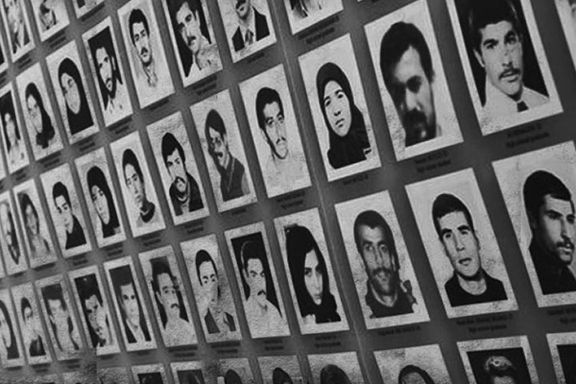
Prominent former UN officials have called for a UN investigation into the 1988 "massacre" of political prisoners in Iran, including the role of President Ebrahim Raisi, at that time.
The open letter released on Thursday, addressed to the UN human rights chief Michelle Bachelet, and seen by Reuters, was signed by some 460 people, including a former president of the International Criminal Court (ICC), Sang-Hyun Song, and Stephen Rapp, a former US ambassador for global criminal justice.
Raisi, who took office in August, is under US sanctions over a past that includes what the United States and activists say was his involvement as one of four judges who oversaw the 1988 killings. Reuters said his office in Tehran had no comment on Thursday.
Iran has never acknowledged that mass executions took place under Ayatollah Ruhollah Khomeini, the revolutionary leader who died in 1989. The victims were mostly members of the Mujahedin-e Khalq Organization (MEK) and leftist activists.
A group of UN human rights experts had issued a warning to the government of Iran in December 2020 that violations related to the massacres of political prisoners in 1988 in 32 cities may amount to crimes against humanity and that they will call for an international investigation if these violations persist. They said that covering up the crime at the present time constitutes additional violations.
Amnesty International has put the number executed at some 5,000, saying in a 2018 report that "the real number could be higher".
"The perpetrators continue to enjoy impunity. They include the current Iranian President Ebrahim Raisi and judiciary chief Gholam-Hossein Mohseni Ejei," said the open letter. Ejei succeeded Raisi as head of Iran's judiciary.
Twenty-five Nobel prize winners in a letter last September to United Nations Secretary-General Antonio Guterres had also urged the UN to set up an international commission to investigate the prison killings and particularly Raisi’s role.
Raisi, when asked about activists' allegations that he was involved in the killings, told a news conference in June 2021: "If a judge, a prosecutor has defended the security of the people, he should be praised." He added: "I am proud to have defended human rights in every position I have held so far."
The letter, organized by the British-based group Justice for Victims of the 1988 Massacre in Iran, was also sent to the UN Human Rights Council, whose 47 member states open a five-week session on February 28.
Other signatories include previous UN investigators into torture and former foreign ministers of Australia, Belgium, Canada, Italy, Kosovo and Poland.
The trial of a man arrested in Sweden for his role in the killings started last year and dozens of survivors and relatives have testified about the way prisoners were executed after summary trials.
Javaid Rehman, the UN investigator on human rights in Iran who is due to report to the session, called in an interview with Reuters last June for an independent inquiry into the allegations of state-ordered executions in 1988 and the role played by Raisi as Tehran deputy prosecutor.
Based on Reuters report
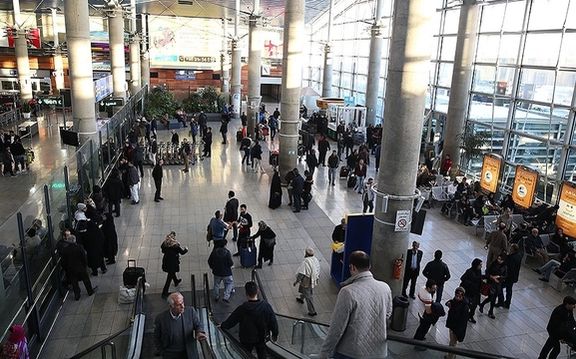
Canada has updated its travel advisory recommending against all travel to Iran, citing general security concerns and “the possibility of arbitrary detention.”
This is the highest risk level issued by Canada, stronger than current general advice to avoid all “non-essential” foreign travel due to the Covid-19 pandemic. “You should not travel to this country, territory or region,” the website states regarding Iran. “If you are already in the country, territory or region, you should consider leaving if it is safe to do so.”
The website points out the lack of a resident Canadian government office in Iran, and that the ability of Canadian officials elsewhere to offer consular assistance is extremely limited.
Canada broke off diplomatic relations in 2012, citing Iran’s support to the Syrian government, non-compliance with United Nations resolutions over the nuclear program, and fears for Canadian diplomats after protestors stormed the British embassy. Relations were not restored as Ottawa lifted most of its sanctions after the 2015 Iran nuclear deal.
According to the advisory, Canadians in Iran could face kidnapping and petty crimes, and women visitors facing sexual harassment. It adds that Canadians might be closely watched and that that innocuous behavior, such as taking photographs in public places or traveling beyond tourist attractions, could lead to investigation.
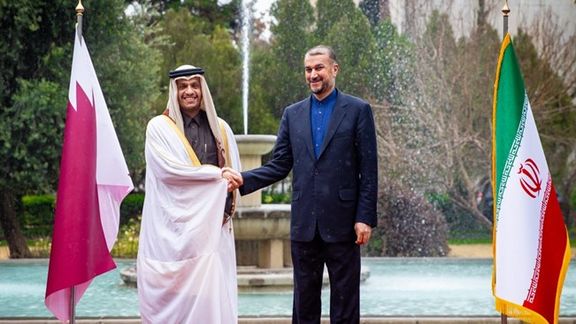
Iran's official news agency Thursday said the visit of Qatari foreign minister to Tehran should not be seen as facilitating direct talks with Washington.
Iranian Foreign Minister Hossein Amir-Abdollahian met his Qatari counterpart Mohammed bin Abdulrahman Al-Thani in Tehran Thursday morning, sparking suggestions in domestic and foreign media that Doha was working for direct US-Iran talks to help revive the 2015 Iran nuclear deal.
In a note headlined "Mistaken Interpretation Of Iran, Qatar Foreign Ministers' Visit," IRNA reported “good and close relations” with Qatar but said “speculation” over “direct talks with the US in Vienna,” where multilateral talks to revive the 2015 deal, had “fueled some misconceptions about the nature of the visit.”
The visit was announced Wednesday, two days after two calls between the two foreign ministers. "Two phone calls can be made when relations are close, developments fast, and the issue at hand important," tweeted Hamidreza Dehghani, Iran’s ambassador to Doha.
The IRNA note, published before the Tehran meeting, reiterated Iran’s stance that the central issue in reviving the 2015 deal, the JCPOA (Joint Comprehensive Plan of Action), was the US need to “return to its commitments” under the agreement, which Washington left in 2018 while imposing ‘maximum pressure’ sanctions.
The note stressed that until this happened a US “presence in the meetings of the Joint Committee [of remaining JCPOA members]” in Vienna would be “irrelevant,” and that “the key to solving the problem is [the US] returning to all commitments under the JCPOA, not mediation.”
IRNA went on to note both that some politicians in Iran had been arguing for direct US talks and that Qatari officials had not refuted speculation about mediation as "they want to gain credit" from posing as a mediator. With the meeting between Amir-Abdollahian and al-Thani focused on “regional” issues, IRNA observed, "Qatar's capabilities and record in this regard [mediation] do not confirm such an interpretation."
Among such regional issues are rising tensions over the United Arab Emirates role in the Yemen war, and recent Ansar Allah, or Houthi, missile attacks in the UAE.
But Qatar's emir Sheikh Tamim bin Hamad al-Thani is due to meet US President Joe Biden January 31, where restoring the JCPOA is likely to be discussed. Doha has called on both the US and Iran to respect the terms of the deal.
While Tehran has refused direct talks with the US since Washington left the JCPOA, and has insisted that the Vienna negotiations, which began in April, should remain formally within JCPOA structures with the US taking part indirectly, there have been recent signs that with Vienna process at a crucial point Tehran is reconsidering.
Talks remain controversial
Amir-Abdollahian said Monday that the possibility of bilateral talks with the US would not be "overlooked" if a "good deal with strong guarantees" was within reach. Ali Shamkhani, Secretary of Iran's Supreme National Security Council (SNSC), also raised the possibility in a tweet Tuesday. President Ebrahim Raisi in a TV interview Tuesday also appeared open, if hesitant, over the prospect.
But such talks remain controversial. The flagship hardliner newspaper Kayhan Tuesday criticized Amir-Abdollahian and Shamkhani, demanding an explanation.
Abdollah Ganji, chief editor of the principlist Jahan newspaper, has preferred to insist that any talks with the US should be bilateral and not within JCPOA structures.
While Raisi has continued approach of former president Hassan Rouhani over US participation in Vienna, some Iranian reformists have been recently pushed for direct US talks as the best way to have ‘maximum pressure’ sanctions lifted.
Ali Khamenei, the supreme leader, who endorsed two years of talks with the US leading up to the JCPOA in 2015 and earlier over Afghanistan and Iran, said in January that “negotiations with the enemy at a certain juncture does not necessarily mean surrender."
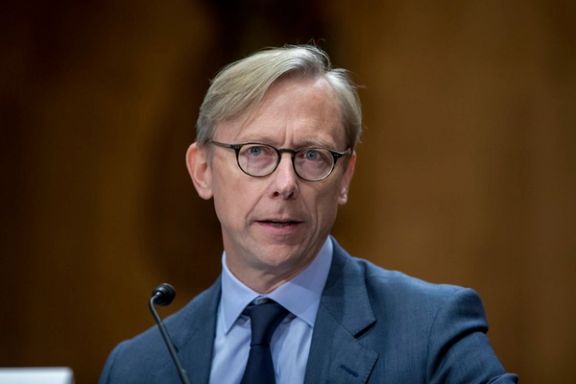
The US State Department has told Congress that a senior former diplomat faces "serious and credible" threats to his safety over the targeted killing of Iranian general Qasem Soleimani.
Brian Hook, former special envoy for Iran, faced threats after Iran vowed vengeance for a US drone attack that killed Soleimani in Baghdad in 2020.
The Washington Free Beacon said on Wednesday that the State Department delivered an unclassified but non-public assessment to Congress on January 11 about a campaign of public death threats aimed at former president Donald Trump and former top officials.
According to the report, "specific threat persists with respect to former special representative [for Iran] Brian Hook," who was instrumental in the operation to kill Soleimani and was at the helm of maximum pressure campaign on Tehran.
The document, seen by the Washington Free Beacon, does not name the actors behind the threats, describing them only as a "foreign power or the agent of a foreign power", but indicates that Hook has been under the threat since at least January 2021.
Earlier in January, a former Iranian diplomat now teaching at Princeton University touted threats against Hook in a documentary, saying, “An American told me that Brian Hook’s wife had not slept for several days and that she was shaking and crying”.
Iran has vowed revengefor its top military operator outside its borders and listed a host of US and Israeli officials as responsible for carrying out the attack.